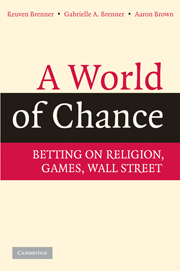Book contents
- Frontmatter
- Contents
- Preface
- Acknowledgments
- 1 From Religion to Risk Management: What to Do When Facing Uncertainty?
- 2 Anything Wrong with Gambling as a Pastime?
- 3 Are You Rich? Risk-Taking and Gambling, or the Leapfrogging Instinct
- 4 Betting on Futures and Creating Prices
- 5 Gambling as Banking: Poker, Junk Bonds, and Central Banks
- 6 Lottery Is a Taxation, and Heav'n Be Prais'd, It Is Easily Rais'd
- 7 Politics and Prohibitions; or, What's a Good Tax Anyway?
- 8 How Gamblers and Risk-Takers Correct the Future
- Appendix 1 Gambling and Risk-Taking: The Leapfrogging Instinct
- Appendix 2 Human Nature and the Civilizing Process
- Appendix 3 A Statistical Profile of Gamblers
- Notes
- Bibliography
- Name Index
- Subject Index
Appendix 1 - Gambling and Risk-Taking: The Leapfrogging Instinct
Published online by Cambridge University Press: 06 July 2010
- Frontmatter
- Contents
- Preface
- Acknowledgments
- 1 From Religion to Risk Management: What to Do When Facing Uncertainty?
- 2 Anything Wrong with Gambling as a Pastime?
- 3 Are You Rich? Risk-Taking and Gambling, or the Leapfrogging Instinct
- 4 Betting on Futures and Creating Prices
- 5 Gambling as Banking: Poker, Junk Bonds, and Central Banks
- 6 Lottery Is a Taxation, and Heav'n Be Prais'd, It Is Easily Rais'd
- 7 Politics and Prohibitions; or, What's a Good Tax Anyway?
- 8 How Gamblers and Risk-Takers Correct the Future
- Appendix 1 Gambling and Risk-Taking: The Leapfrogging Instinct
- Appendix 2 Human Nature and the Civilizing Process
- Appendix 3 A Statistical Profile of Gamblers
- Notes
- Bibliography
- Name Index
- Subject Index
Summary
Which shows how to translate the view about human nature underlying this book, the words “taking risks” and “leaping into uncertainty” into mathematics, and how this view differs from conventional ones; it also shows why the other views do not hold up to close scrutiny.
Introduction
“A new idea does not come forth in its mature scientific form. It contains logical ambiguities or errors; the evidence on which it rests is incomplete or indecisive; and its domain of application is exaggerated in certain directions and overlooked in others,” wrote Stigler in one of his essays on the history of economics.
These sentences summarize the justification for presenting the model of risk-taking and decision making on which the arguments in this book rely, despite that its essential features have been presented in the work of R. Brenner (1983, 1985, 1987). I made various approximations in those early works, omitted details, and overlooked some implications. This appendix presents corrections and compares it with other models that try to explain decision-making and risk-taking behavior, a comparison that earlier works made only in passing.
The points emphasized in this appendix are only those that I judged pertinent to the subject matter covered in this book: gambling, insurance, progressive taxation, decision making in general, and the link to sources and allocation of capital.
- Type
- Chapter
- Information
- A World of ChanceBetting on Religion, Games, Wall Street, pp. 213 - 250Publisher: Cambridge University PressPrint publication year: 2008



